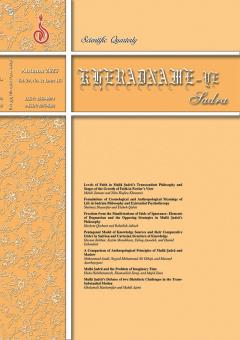-
-
List of Articles
-
Open Access Article
1 - Editor's Note
S. Mohammad Khamenei -
Open Access Article
2 - Levels of Faith in Mullā Ṣadrā’s Transcendent Philosophy and Stages of the Growth of Faith in Fowler’s View
Mehdi Zamani Ziba Shafiee khoozani -
Open Access Article
3 - Foundations of Cosmological and Anthropological Meanings of Life in Sadrian Philosophy and Existential Psychotherapy
shahnaz shayanfar elaheh ghaleh -
Open Access Article
4 - Freedom from the Manifestations of Idols of Ignorance: Elements of Dogmatism and the Opposing Strategies in Mullā Ṣadrā’s Philosophy
Hashem Qorbani Rohollah Adineh -
Open Access Article
5 - Pentagonal Model of Knowledge Sources and their Comparative Order in Sadrian and Cartesian Structure of Knowledge
Hassan Rahbar Kazim Mosakhany Eshaq Asoodeh Hamid Eskandari -
Open Access Article
6 - A Comparison of Anthropological Principles of Mullā Ṣadrā and Maslow
Mohammad Azadi Seyyed Mohammadali Dibaji Masoud Azarbaijani -
Open Access Article
7 - Mullā Ṣadrā and the Problem of Imaginary Time
Huda Habibimanesh shamsollah seraj Maijd Ziaei -
Open Access Article
8 - Mullā Ṣadrā’s Defense of two Dialetheic Challenges in the Trans-Substantial Motion
Gholamali Hashemifar Mahdi Azimi
-
The rights to this website are owned by the Raimag Press Management System.
Copyright © 2017-2026







